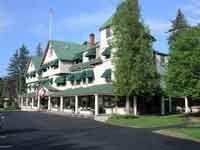Wentworth Hall

Wentworth Hall, 1882 to 1883
Joshua Trickey built the original building on this site, the Thorn Mountain House, in 1869 as a wedding present for his youngest daughter, Georgia, and her husband, General Marshall Clark Wentworth. Capt. Trickey was the first in Jackson to entertain summer guests from abroad and was the proprietor of the Jackson Falls House, built in 1858. (The Jackson Falls House stood on the site of the present Post Office.)
General Wentworth was born in Jackson in 1844 and raised on his father’s farm. He served in the Civil War although his title was honorary, given to him by New Hampshire Governor Charles Bell, for whom he served as quartermaster general in 1881-82.
Sometime around 1880 General Wentworth began the task of expanding and reorganizing the hotel complex under the principles of a “cottage system”. The vision that Wentworth had for the hotel and the entertainment of their guests was both bold and original among White Mountain grand resort hotels but which illustrates a hotel management system then being employed in Great Britain. Under the new plan, the building known as Wentworth Hall was to act as the nucleus for a group of nine detached cottages.
The system offered guests much desired privacy in separate cottages while facilitating social interaction in the public spaces of the main hotel. Wentworth hired New York City architect William A. Bates (1853-1922) to perform the master planning and execute the separate building designs, most of which were Queen Anne in style. Wentworth Hall, the principal service building for the complex was the second building constructed, after Arden Cottage.
Completed in 1883, Wentworth Hall is said to be a reproduction of an “English manorial hall of Queen Anne’s day”. Its luxurious appointments included running stream water, steam heat, telephone and telegraph service, electric bells, open fireplaces in all public rooms, well-engineered sanitation and a magnificent dining hall. It contained a smoking room, a children’s and nurse’s dining room and thirty sleeping rooms painted in robin’s egg blue.
Wentworth Hall was a tremendous success during the 1880s and 1890s. Gen. Wentworth went on to also manage other successful resorts including the Laurel House in Lakewood, New Jersey; La Pintoresca and the Raymond at Pasadena, California; and the New Frontenac in the Thousand Islands of the St. Lawrence River as well as building the Hotel Huntington in Pasadena.
In 1915, General Wentworth died and the hotel complex was sold by Mrs. Wentworth to Nathan and Estelle Amster, a wealthy Jewish couple from New York. Under their ownership, the Wentworth became the exclusive domain of wealthy Jews from the northeast and anyone wishing to stay would have to be recommended by other patrons.
Estelle Amster continued to own the Wentworth Hall complex as well as Wentworth Castle until 1946 and the hotel continued to thrive. The property was bought by Harry Schiener and E.M. Loew, the movie theater magnate, in 1950. Two orchestras played in the casino which could seat 400 people. Among the entertainers were Alan King, Harry Belafonte, Zero Mostel and Jackie Mason. However, the days of summer vacationing at grand hotels were quickly becoming a thing of the past. In the years following World War II, escalating costs and changing vacation patterns made large hotels increasingly unprofitable. The decline of the Wentworth and most of New England's resort hotels began in the early 1960s.
In 1971, the Wentworth was temporarily closed and sat boarded-up and dilapidated for the next decade. Wentworth Hall was purchased by new owners in 1972 who intended to tear it down and build a modern hotel and vacation chalets. In 1982, the 233 acre Wentworth Hall property was purchased by developer Earnest J. Mallett, Jr. who invested more than $2 million into the complex. The structurally unsound and functionally unstable buildings including the casino were removed until just nine of the thirty-nine buildings remained. A total of seventy-six townhouse units were constructed in nineteen buildings around the perimeter of the golf course.
In the early 1980s, federal energy laws were passed that gave hydro-electric companies the right to pursue property for hydro-electric projects. The Jackson Falls area of the Wildcat was threatened with just such a hydro-electric project. To forestall this, a group of residents and town officials began seeking a "Wild and Scenic River" designation for the Wildcat.
To faciliate this effort, Ernie Mallett and his family deeded land from the Wentworth property along Jackson Falls to the town. The deed stipulated that no structures, including a hydro-electric dam, could be built on this land. (Ernie Mallet also donated land to the town cemetary for additional grave sites and to the church for a playground.) The "Wild and Scenic River" designation was achieved in 1988. At the same time, the town approved zoning ordinance changes that created a river conservation district to further protect the Wildcat.
The Wentworth was acquired by Fritz and Diana Koeppel in 1988 and continues to serve as an elegant country inn with a world-class reputation. Of the thirty grand resort hotels that were once present in the White Mountain region, Wentworth Hall is one of only four grand resort hotels remaining open for business today (the others being The Balsams, the Mount Washington Hotel and the Mountain View House.)

